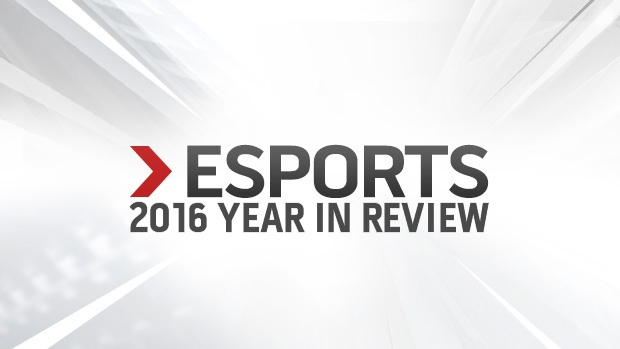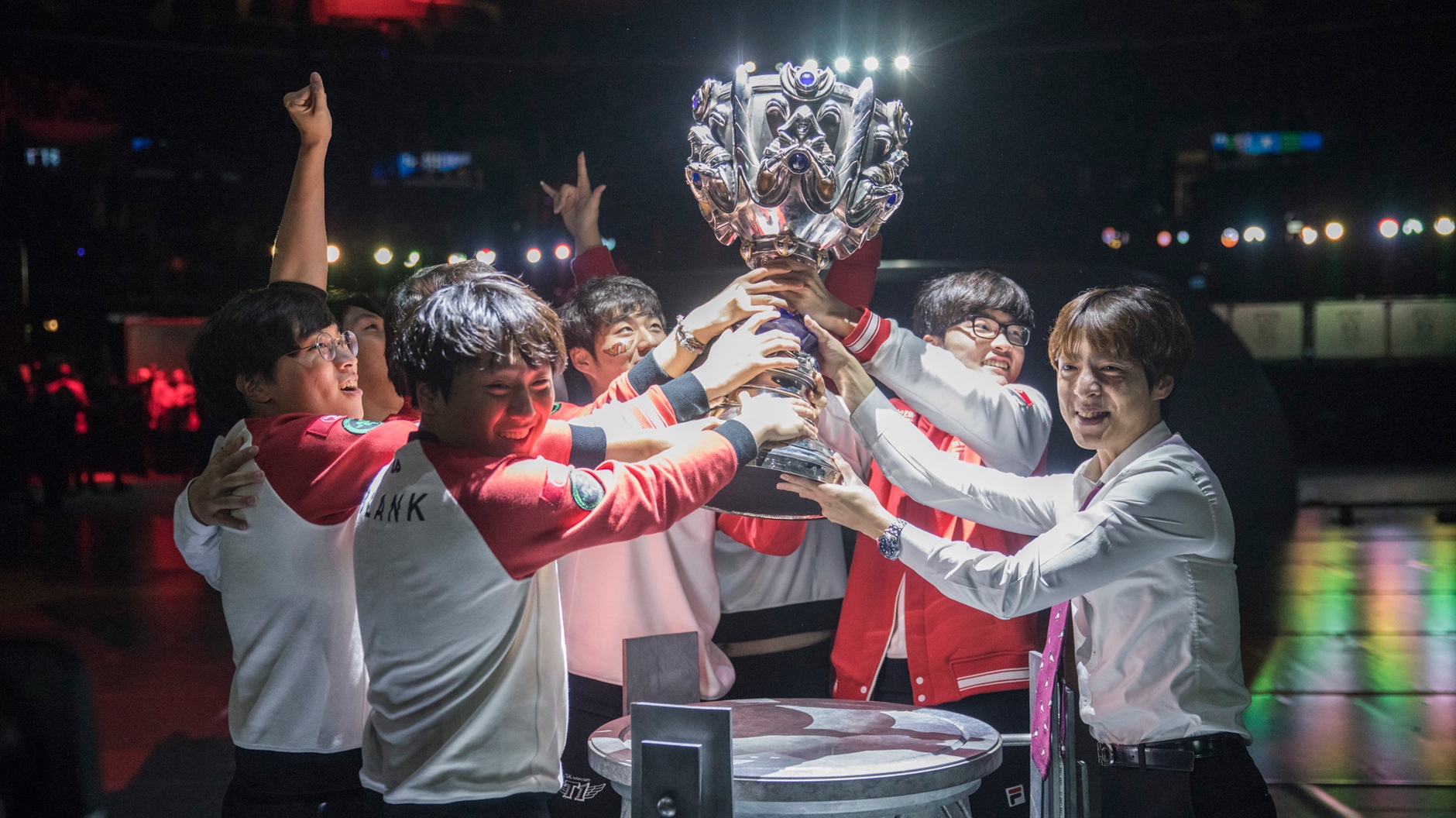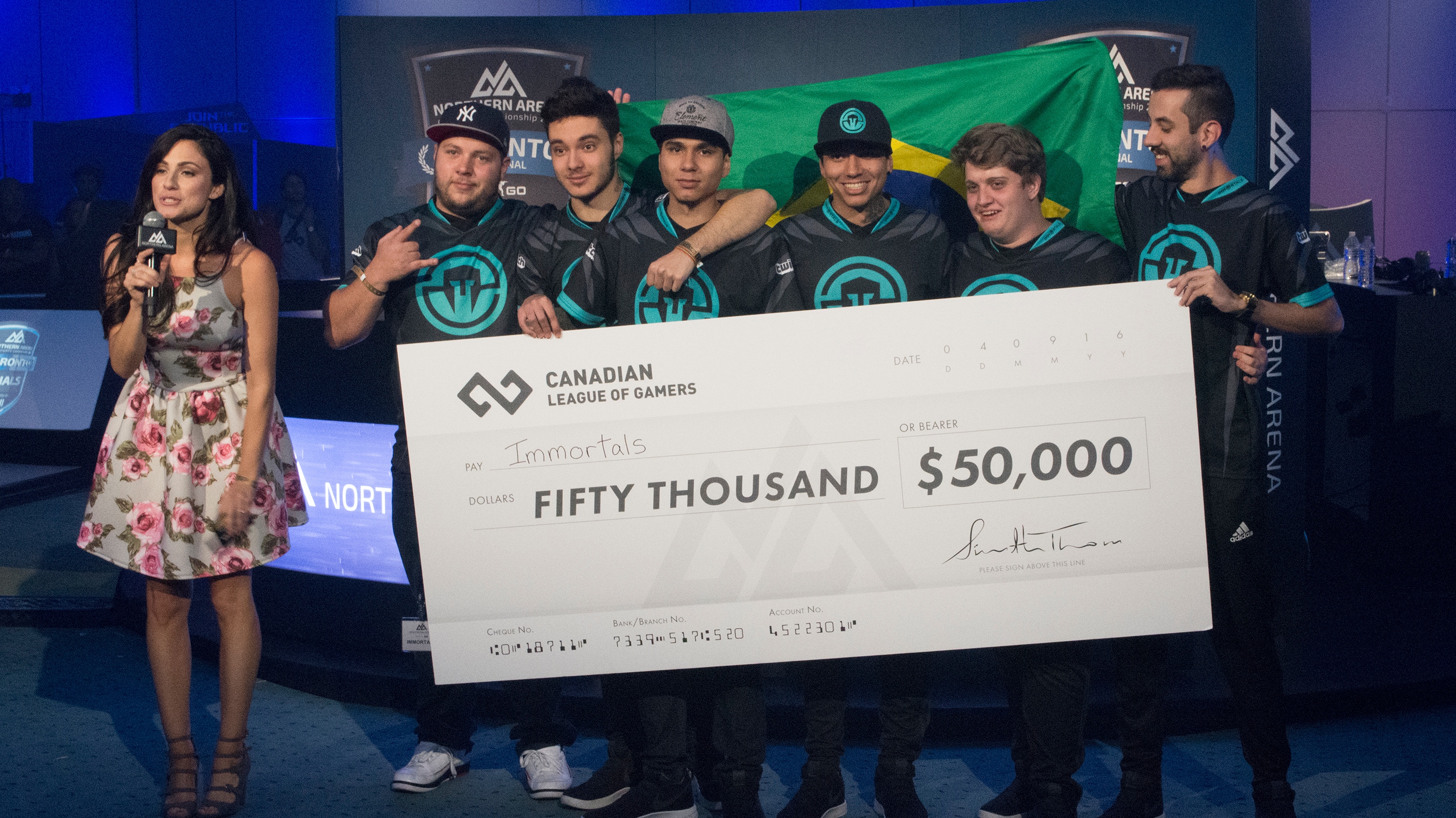Dec 30, 2016
TSN Esports' most memorable moments of 2016
While planning and preparation began near the end of 2015, the launch of TSN’s brand new esports hub came in 2016. Here are some of our most memorable esports moments from the past year.
, TSN.ca Staff

While planning and preparation began near the end of 2015, the launch of TSN’s brand new esports hub came in February of 2016.
It was the product of many months of content plans and populating a site with no audience, but we worked tireless hours to try and catch up to the fast-paced world of competitive gaming.
Adding video games to the discussion in a traditional sports newsroom was a culture shock to say the least, but it has turned into a tremendous learning experience that opened our eyes to a new generation of competition, competitors and fans.
The debate is a long and arduous one between traditional sports and esports purists, but as our team dug deeper, we found that the two aren’t so different.
There are heroes and villains, stars and role players, and fans with an unwavering passion for the games and their characters. This past year we’ve even seen a bigger crossover than ever with many traditional sports franchises and athletes getting involved with esports through investments or the acquisition of teams and organizations.
We haven’t convinced everyone that esports belongs on our site - check the social media comments - but we have made a few believers and will continue to expand our coverage and provide compelling content for our audience. We are still learning about the space but we couldn’t be more excited to see what 2017 holds for TSN esports.
As far as 2016 goes, here are some of our most memorable moments from the past year.
—
THE DYNASTY
SK Telecom T1 ruled League of Legends with the most dominant season in the history of the game.
The roster of mid laner Lee “Faker” Sang-hyeok, top laner Lee “Duke” Ho-Seong, junglers Bae “Bengi” Seong-woong and Kang “Blank” Sun-gu, AD carry Bae “Bang” Jun-sik and support Lee “Wolf” Jae-wan defeated all challengers and took home the titles at IEM Katowice, the LCK Spring Playoffs, the Mid-Season Invitational, the LCK Summer Playoffs and the Season 6 World Championship.

A gruelling 3-2 win over fellow Korean squad Samsung Galaxy in the Grand Finals at the World Championship was SKT’s second consecutive Summoner’s Cup and the third in four years. It capped off the first Triple Crown - wins at IEM Katowice, MSI and Worlds - in League of Legends history. The team also took home a record grand prize of $2.028 million at worlds.
Faker and Bengi became the first three-time world champions in League history.
The 2016 edition of SKT is arguably the best League of Legends team of all time, but the club will head into the new year with a different look after losing Duke and Bengi to free agency and signing top laner Heo “Huni” Seung-hoon and jungler Han “Peanut” Wang as their replacements.
—
NORTHERN HOSTS
Esports came to Canada in a big way in 2016 with three major events in the second half of the year.
At the end of August, the North American League Championship Series brought its Summer Playoffs to a sold out crowd at the Air Canada Centre. The building was packed for two days of breathtaking action.
In the third-fourth place matchup, Immortals defeated Counter Logic Gaming 3-2 to earn a third-place finish for the second consecutive split on the opening day. Immortals’ Canadian AD carry Jason “WildTurtle” Tran put on a show for the home crowd in the series decider with a 10/1/5 performance on Ezreal.
The Toronto fans chanted the name of the hometown hero as he led his team to victory.
Team SoloMid emerged victorious to win the NA LCS Summer Playoffs with a 3-1 win over Cloud9 on the second and final day of competition.
A week later, Northern Arena brought its esports championship presented by Bell to FanExpo in Toronto for four amazing days of competition across three major titles - Counter-Strike: Global Offensive, Hearthstone and Clash Royale.
The CS:GO tournament was the crown jewel of the event with 13 of the best teams in the world and two Canadian qualifiers doing battle over four days for a piece of the $100,000 prize pool.
Despite a handful of costly delays and a rule infraction that derailed the final for hours, brazilian squad Immortals came out on top over fan-favourite Cloud9 in the finals to take home the $50,000 grand prize.

The Hearthstone and Clash Royale events featured $8,000 and $10,000 prize pools, respectively.
The Northern Arena Esports Championship presented by Bell got bigger and better for the Montreal LAN Finals in the middle of November with the addition of the Dota 2 BEAT Invitational and the Gears of War 4 Canadian Qualifier.
The BEAT Invitational welcomed The International 6 champions Wings Gaming, TI5 champions Evil Geniuses and Chinese powerhouse EHOME to the Bell Centre to battle amongst a group of eight heavyweights.
Wings took the top prize of $50,000, followed by second-place finishers Team NP at $25,000 and third-place EHOME at $15,000.
A more exclusive CS:GO tournament saw eight teams compete for the $100,000 prize pool. OpTic Gaming exacted revenge after a lacklustre showing in Toronto to capture the $50,000 grand prize while newcomer G2 Esports earned $20,000 for a second place finished. Heroic earned $10,000 for a second straight third-fourth finish and were joined by Team EnVyUs.
Northern Arena will be back in 2017, but here’s hoping even more marquee esports events find their way north of the border in the coming year.
—
GETTING NOTICED
While keyboard warriors debated ad nauseam about the validity of esports, the world of traditional sports ended the argument with a bang.
Traditional sports franchises and individuals took notice of esports in 2016 and proved its worth with their wallets.
Professional soccer clubs Valencia CF, Manchester United, Manchester City, FC Schalke 04, AFC Ajax, Paris Saint-Germain, Dynamo Kiev and Panathinaikos F.C. all made the leap into esports across numerous titles. Schalke broke ground for the soccer clubs in esports with its inclusion in the 2016 League of Legends European League Championship Series Summer Split.
The team stumbled to an eighth-place finish and was relegated but they will have a chance to return to the top flight by competing in the EU Challenger Series in the 2017 Spring Split.
North American sports franchises were not to be outdone. The NBA was the major player on this side of the pond with numerous acquisitions and investments into competitive gaming.
Sacramento Kings co-owner Andy Miller founded NRG eSports in 2015, but it was 2016 that saw the team add NBA Hall of Famer Shaquille O’Neal as an investor. The team also welcomed BioSteel as a sponsor in the first bench deal in esports history. Former and current MLB players Alex Rodriguez and Jimmy Rollins are also investors in the organization.
The Philadelphia 76ers became the first North American club to purchase an esports organization with the acquisition of Team Apex and Team Dignitas in September, the Houston Rockets brought in former Team Archon co-owner Sebastian Park at the beginning of December to head up the planning of its foray into the industry and Milwaukee Bucks co-owner Wesley Edens was reported to be in the process of purchasing of Cloud9 Challenger’s North American League Championship Series position for $2.5 million.
The crossover of traditional sports into esports has just begun. Although 2016 was a banner year, expect much more from the year to come.
—
CHA-CHING
Esports was shown the money in 2016 with record-breaking prize pools dominating the headlines for most of the year. Prize money reached new heights with $92.1 million in 3,500 events - up more than $26 million over 2015’s totals in nearly 1,300 fewer tournaments.
The International 6 led the way for individual events with a whopping $20,770,640 up for grabs this season. The money, mostly contributed by dedicated fans, surpassed last year’s record total by more than $2.3 million. The prize pool for Dota 2’s marquee event has grown by $9.84 million since 2014.
The winners of TI6, China’s Wings Gaming, took home a grand prize of $9.14 million. The former roster of Chu “Shadow” Zeyu, Zhou "bLink" Yang, Zhang "Faith_bian" Ruida, Zhang "y`" Yiping and Li "iceice" Peng each secured $1.83 million for their efforts.
Dota 2 led the way for game prize totals in 2016 as well, including another year of three majors - Shanghai, Manilla, Boston - with a $3 million pot and $1 million grand prize:
ESPORTS PRIZE MONEY BY TITLE IN 2016
| GAME | TOTAL PRIZE MONEY ($) |
|---|---|
| Dota 2 | $36,451,051.07 |
| Counter-Strike: Global Offensive | $17,194,517.67 |
| League of Legends | $10, 223,817.30 |
| Heroes of the Storm | $4,610,149.10 |
| Call of Duty: Black Ops III | $3,749,030.66 |
Other major players found their footing in 2016, with League of Legends nearly doubling its total at the World Championships to $5.07 million. SK Telecom T1 captured the top prize of $2.028 million in its second consecutive world title and third in four years.
Halo burst into the top-five tournaments with its $2.5 million world championship, while Call of Duty doubled its worlds pool to $2 million and Blizzard added $1 million events for Hearthstone and Heroes of the Storm at BlizzCon 2016.
The most powerful aspect of these prize pools is how much is often contributed by the fans. Through in-game purchases and revenue sharing, the spectators are key factors in the growth of the games, the prize pools and the industry as a whole.
If the growth from 2015 to 2016 tells us anything, it’s that teams, leagues and fans will have global esports prize pools surpassing $100 million sooner rather than later.
